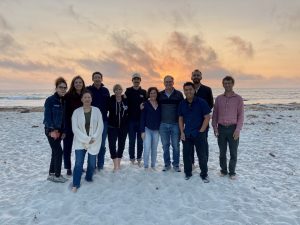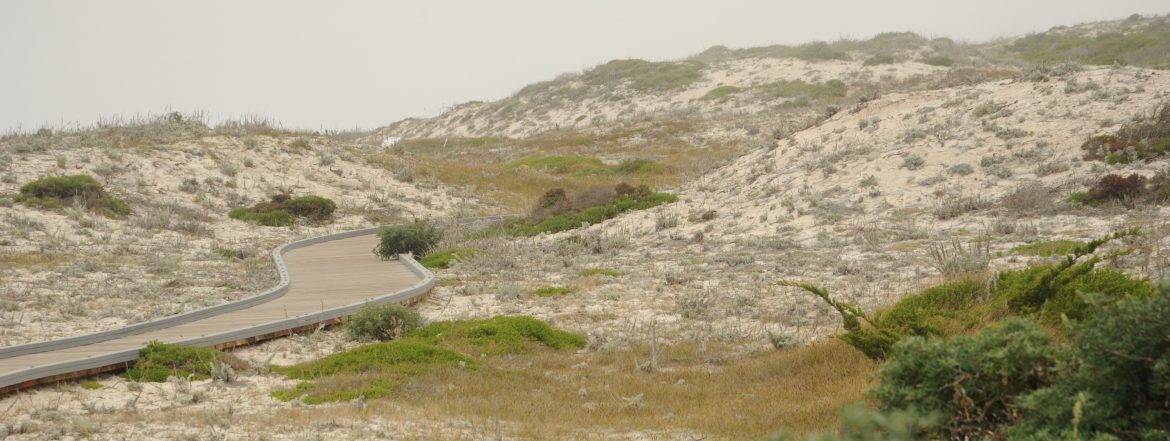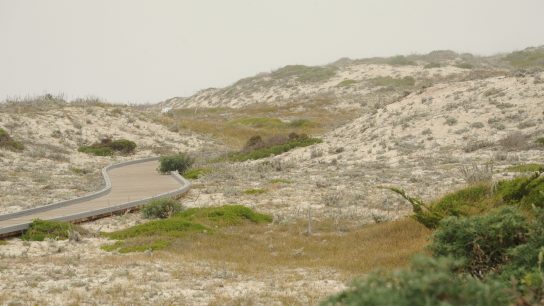Philosophy Works: An Interview with Alex Dayer
by
Alex Dayer (UC Merced) spoke to UCHRI Research Grants Program Director, Sara Černe, about diversifying career pathways for philosophy graduate students for a Foundry series highlighting the work of the Institute’s recent grantees and the methods, approaches, and challenges they have employed and encountered.
“‘Philosophy Works’ was created under the assumption that philosophy PhDs have much to offer outside of academia, and further, that many who do choose to leave academia will find fulfilling and socially impactful jobs: often with higher pay, in places they want to live, and with more prospects for mobility.”
Tell us about “Philosophy Works” and your own role in the project.
Organized by Carolyn Dicey Jennings, my dissertation advisor from UC Merced, Tina Rulli from UC Davis, and Barry Lam from UC Riverside, “Philosophy Works” was a UCHRI-funded workshop designed to explore career options for philosophers outside of academia. Like graduates in most academic disciplines, lots of philosophy PhDs do not obtain permanent academic employment. This proportion is even larger if we consider folks who do not finish graduate school: Nearly a third of philosophy PhD students leave their program before finishing. So, many people who apply for philosophy PhD programs ultimately end up in non-academic careers. We were interested in ways to best support and prepare philosophy PhD students who choose to change professional trajectories.
Although some PhD graduates only see non-academic positions as backup options, those jobs often offer refuge from academia. That is, many working in academia find themselves in temporary positions, with low pay, in places they don’t want to live, and with limited prospects for professional mobility. As a result, graduate students in philosophy (and across all of academia) are increasingly seeking non-academic careers as an alternative.
Even though many philosophy PhDs will end up having non-academic careers, there is little explicit encouragement and preparation for them. In fact, some philosophy departments actively discourage students from pursuing jobs other than teaching philosophy. “Philosophy Works” was created under the assumption that philosophy PhDs have much to offer outside of academia, and further, that many who do choose to leave will find fulfilling and socially impactful jobs: often with higher pay, in places they want to live, and with more prospects for mobility.
The workshop had two major objectives. First, we wanted to explore potential career options for philosophers outside of academia. What sort of jobs are philosophers actually getting outside of academia? Second, we wanted to explore best practices for supporting philosophy PhD students who choose to seek non-academic careers. What sorts of resources and support do graduate students need? 1
My role in “Philosophy Works” was primarily doing background research to answer the two questions above. Building on previous work on academic placement data, I researched what non-academic careers philosophers gravitate toward and what departments can (realistically) do to support students who make the decision to leave academia. These research materials were used as a springboard for brainstorming sessions at the workshop.
“Most graduate students in philosophy pursue a PhD because they find philosophy intrinsically valuable. […] However, many students often find that studying philosophy is instrumentally valuable.”
Can you share a little bit about the process of compiling your group’s list of guidelines and recommendations and the four thematic pillars you focused on?
The organizers decided to structure the workshop around four pillars: the value of philosophy; career options for philosophers; skills needed to enter those careers; and changing the curriculum to support students seeking non-academic employment.
The first session focused on the value of philosophy. We examined ways in which philosophy adds value to lives, careers, and workplaces. The primary objective of this session was to articulate the value of a graduate degree in philosophy and the best way to convey it to different audiences (in particular, employers). Most graduate students in philosophy pursue a PhD because they find philosophy intrinsically valuable. That is, they tend to love doing philosophy for its own sake. However, many students often find that studying philosophy is instrumentally valuable. It helps them develop skills that are applicable to a wide range of settings (e.g., high-level problem solving, comfort with uncertainty, flexibility, technical writing, intellectual humility and consistency, a willingness to accept and offer critique, etc.). Workshop attendees collaborated to identify the key components of a value statement, which can be used to communicate the value of philosophy on department websites but can also be helpful in job interviews and other conversational settings. The main takeaway of this session was that there are several ways to characterize the value of philosophy; however, one may want to emphasize different aspects depending on one’s audience.
 Faculty participants from across the University of California gather at Asilomar Conference Grounds to discuss career diversity and curricular changes in philosophy graduate programs. Image credit: Sara Černe
Faculty participants from across the University of California gather at Asilomar Conference Grounds to discuss career diversity and curricular changes in philosophy graduate programs. Image credit: Sara Černe
The second session explored career options for philosophers. In this session, we discussed what career options are available for philosophers and how to best encourage and support students pursuing them. Relying on data from previous Academic Philosophy Data and Analysis (APDA) reports, we found that the most common non-academic positions for philosophy PhDs were in education, technology, law, consulting, healthcare, government, non-profits, finance, art, and publishing. We determined that it is best to present non-academic career options to prospective graduate students as well as to first-year students, but we noted that most first- through third-year students tend to not be interested in alternative career paths. We also decided that it is best to not frame the decision between academia and non-academic careers as an either/or situation, and that it is best to keep doors open. Some of our concrete suggestions for increasing career inclusivity include: having career panels with philosophers who now work in the industry; incorporating non-academics into talk series; and making discussions of non-academic career paths a formal part of graduate training.
Overall, there were three major takeaways from this session. First: Be open to students’ unique needs and interests and do not pigeonhole them based on assumptions about their preferences. Second: We should create opportunities for graduate students to explore their interests during their time in graduate school. Third: Philosophy departments ought to strive to make industry connections, so that philosophy PhDs can have clearer paths to non-academic employment.
“Taking part in the conversations at the workshop was incredibly impactful for me, almost therapeutic in a way.”
The third session focused on skills that philosophers will need to pursue non-academic careers. Academic and non-academic careers often depend on similar skill sets, but awareness of career paths beyond academia might require philosophy PhD programs to expand what sorts of skill training they offer. Of course, some careers require specialized training and an entirely different degree (e.g., law school or specialized medical training). But we think that philosophy programs can still do a great deal to prepare PhD students for non-academic careers. We compiled a list of skills that nearly all philosophy PhD programs can use to prepare students for both academic and non-academic careers. The skills were teamwork, leadership/mentoring, networking and information technology skills, building a professional web presence, community building, and the ability to pitch ideas to a wide variety of audiences.
A major takeaway of this session was a set of concrete suggestions for programs to help develop these skills. We suggest specialization clusters (reading groups, small projects, etc.) to develop teamwork, leadership/mentoring, networking, and community building skills; professional development workshops to help students build a professional web presence and learn about grant writing/fundraising; service requirements to help with event planning and community building; and a UC-wide alumni network to help non-academics learn to network.
The final session focused on changing the curriculum to best support philosophy PhDs seeking non-academic employment. Programs vary quite a bit in their success preparing students for non-academic careers, but we focused on those that do well and identified similarities across them. We recommend more flexibility with time to degree completion as well as language and logic requirements, internship and placement support structures, and increased alumni involvement. We also discussed the cultural transition from academia, which is often an emotionally difficult time for PhD graduates.
We suggest altering the language around the decision (“transitioning” or “pivoting” from academia instead of “leaving”) as well as changing the framing around non-academic careers (instead of treating non-academic paths as a “plan B,” they ought to be treated as equally attractive alternatives).
As an advanced graduate student and one who has spent a lot of time surveying the state of graduate programs all over the country, what would you recommend as the top three things humanities departments across the University of California could do to encourage and enable career diversity for their graduates?
I think the top three things UC humanities departments can do to encourage and enable career diversity are 1) reduce stigma surrounding alternative careers paths, 2) seek more alumni involvement, and 3) cultivate more industry connections.
Reducing the stigma surrounding alternative career paths will help PhD students make decisions that are best for them, without fear that they will be negatively perceived by their academic peers. Philosophy PhDs working outside of academia often report that their jobs are incredibly fulfilling, in part because their work frequently has a more immediate social impact compared to their academic work. There is plenty of fulfilling, challenging, intellectually rigorous work to be done outside of academic philosophy, and no one should be shamed for pursuing that work.
Seeking more alumni involvement will help build networks for existing graduate students. Many philosophy PhD students report not knowing what they are qualified to do, other than teach philosophy. However, exposure to philosophy PhDs who find success and fulfillment outside of academia can act as a source of inspiration, guidance, and mentorship for those who are considering non-academic careers.
UC humanities departments also ought to work actively to cultivate industry connections. Perhaps the most straightforward way to do this is to keep in contact with alumni who have pivoted to non-academic positions. But there are also other ways to foster industry connections such as setting up internships, inviting non-academics to talk series and events, and hosting career panels.
What has been most impactful for you in this project and how have you come to redefine ‘impact’ as a result of this work?
Taking part in the conversations at the workshop was incredibly impactful for me, almost therapeutic in a way. I am nearing the end of my PhD, and a lot of the issues we discussed are directly applicable to my personal situation. Trying to decide if I should stay in academia or pursue an alternative path has been emotionally exhausting! I have always wanted to teach because I love the immediate social impact it has. However, working on this project has opened my eyes to a variety of other career paths that may be equally fulfilling and socially impactful. It has helped me realize that philosophy PhDs have rewarding careers both inside and outside academia, and that there are lots of ways to have social impact that don’t involve a classroom.
Banner image credit: Wonderlane


